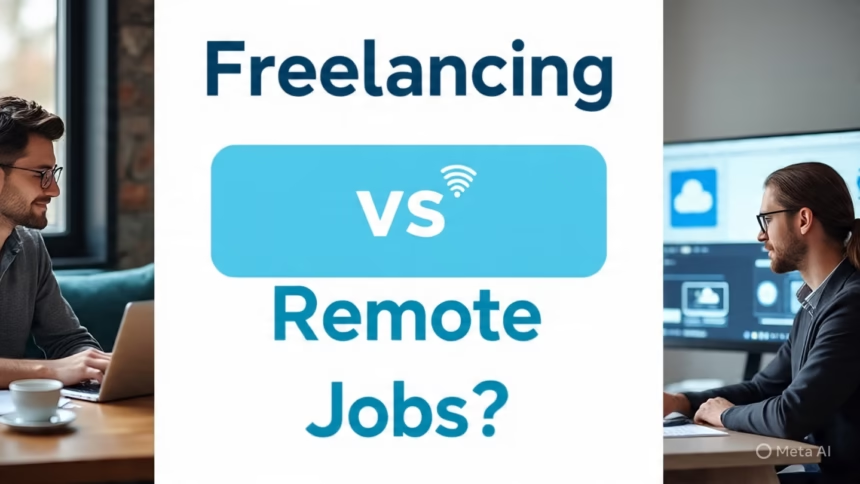Introduction: Freelancing vs Remote Jobs
The workforce in 2025 looks nothing like it did a decade ago. With advanced tech, AI integration, and global workforces, traditional office jobs are fading fast. Two work models now dominate the conversation: Freelancing vs Remote Jobs. But which one suits you best?
In this detailed guide, we compare Freelancing vs Remote Jobs across income, flexibility, stability, skills needed, and career growth. Whether you’re a student, professional, or career switcher, this guide will help you choose your ideal path.
1. What is Freelancing?
Freelancing vs Remote Jobs ,
Freelancing means working independently on a project basis. Freelancers are not tied to a single employer but serve multiple clients.
🔹 Common Freelancing Niches:
- Graphic design
- Web development
- Writing and copyediting
- Virtual assistance
- Social media marketing
- AI prompt engineering
🔹 Top Platforms for Freelancing:
- Upwork
- Fiverr
- Freelancer
- Toptal
- PeoplePerHour
2. What is a Remote Job?
Freelancing vs Remote Jobs ,
A remote job is a full-time or part-time role with a single company, performed from home or any location outside the traditional office.
🔹 Common Remote Job Roles:
- Customer support
- Software development
- Content management
- Marketing executive
- HR & recruiting
🔹 Top Platforms for Remote Jobs:
- Remote.co
- We Work Remotely
- FlexJobs
- AngelList
- Indeed (Remote filter)
3. Freelancing vs Remote Jobs: Key Differences
Freelancing vs Remote Jobs ,
| Feature | Freelancing | Remote Job |
|---|---|---|
| Job Type | Project-based | Long-term employment |
| Income | Variable (per project) | Fixed (monthly salary) |
| Schedule | Fully flexible | Set working hours |
| Stability | Unpredictable | Relatively stable |
| Client/Employer | Multiple | One |
| Tax Filing | Self-employed taxes | Employer-handled taxes |
| Tools Needed | Portfolio, contracts | Company tools and VPNs |
4. Pros and Cons of Freelancing in 2025
✅ Pros:
- Ultimate flexibility in working hours and location
- Higher earning potential per project
- Work with global clients
- Choose your niche and rates
- Full control over career
❌ Cons:
- Inconsistent income
- No job security or benefits
- Requires self-discipline and self-marketing
- You manage everything (taxes, invoices, negotiations)
5. Pros and Cons of Remote Jobs in 2025
✅ Pros:
- Stable monthly income
- Employee benefits (health insurance, bonuses, etc.)
- Career progression in a single company
- Easier to plan finances
❌ Cons:
- Fixed hours may feel restrictive
- Dependence on one employer
- Less control over workload
- Limited ability to say no to tasks
6. Income Comparison: Who Earns More in 2025?
Freelancing vs Remote Jobs ,
- Freelancers can earn $25–$150 per hour depending on niche and expertise. Top freelancers in tech, design, and writing earn over $10,000/month.
- Remote job employees generally earn $2,500–$7,000/month, depending on role and experience. Benefits may include bonuses, stock options, and paid leave.
💡 Insight: Freelancers have higher earning potential, but remote jobs offer consistent income.
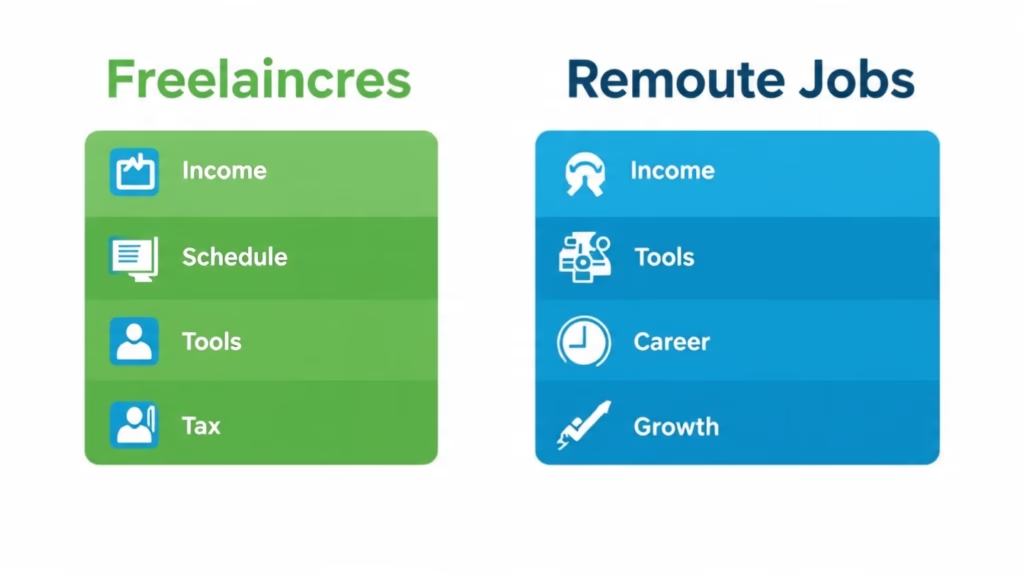



7. Skills Required for Freelancers in 2025
Freelancing vs Remote Jobs ,
To succeed as a freelancer, you’ll need:
- Time management
- Negotiation and communication
- Personal branding
- Technical niche skills (AI, dev, design, etc.)
- Financial and tax management
- Lead generation (cold emails, Upwork profiles, LinkedIn networking)
8. Skills Required for Remote Job Workers in 2025
Freelancing vs Remote Jobs ,
For remote employment, focus on:
- Communication (Slack, Zoom, email etiquette)
- Collaboration (Trello, Asana, Notion)
- Time tracking
- Adaptability to remote culture
- Specific role-based skills (e.g., coding, writing, marketing)
9. Which is Better for Beginners in 2025?
Freelancing vs Remote Jobs ,
✅ Start with Remote Jobs if you:
- Want stable income
- Prefer structure and guidance
- Are learning industry practices
✅ Try Freelancing if you:
- Want full independence
- Are confident in a skill
- Are ready to hustle and manage yourself
10. How to Transition from Remote Job to Freelancing
Freelancing vs Remote Jobs ,
- Start freelancing part-time
- Build a portfolio while working your job
- Network and collect testimonials
- Set income goals before quitting
- Transition gradually
11. Freelancing vs Remote Jobs in Different Industries
| Industry | Freelancing | Remote Job |
|---|---|---|
| Tech | High demand, high pay | Steady roles, long-term projects |
| Design | Flexible, portfolio-driven | Branding, UI/UX roles |
| Marketing | Copywriting, SEO gigs | Strategy and analytics roles |
| Writing | Blog/article gigs | Company content writer/editor |
| Education | Course creation, tutoring | Online instructor, curriculum designer |
12. Which Career Path Fits Your Personality?
You might love freelancing if you are:
- Self-motivated
- Independent
- Risk-taker
- Entrepreneurial
You might prefer remote jobs if you:
- Like structure
- Prefer team collaboration
- Value income stability
- Avoid handling business operations
13. Tax, Legal & Work Setup: What’s Different?
| Legal Aspect | Freelancing | Remote Jobs |
|---|---|---|
| Tax | Self-employed (1099) | Employee (W-2 or local tax form) |
| Contracts | Freelancer writes/signs | Company handles |
| Setup | Laptop, payment accounts, invoice software | Company may provide tools |
14. Future Trends: What Will Dominate in 2025 & Beyond?
Freelancing vs Remote Jobs,
- Freelancing is growing 3x faster than traditional employment.
- AI tools are making freelancers more efficient.
- Remote jobs are becoming hybrid (3 days remote, 2 days in-office).
- Companies are outsourcing more tasks to contract freelancers.
🚀 Prediction: Freelancers will dominate creative, tech, and AI industries, while remote jobs will expand in corporate, marketing, and customer service.
Conclusion: Which Should You Choose in 2025?
There is no universal answer — the choice between Freelancing vs Remote Jobs depends on your goals, personality, and lifestyle preferences.
Choose Freelancing vs Remote Jobs
| Choose Freelancing if: | Choose Remote Jobs if: |
|---|---|
| You want freedom & control | You want income stability |
| You enjoy working solo | You prefer team dynamics |
| You can manage clients | You like fixed routines |
| You aim for high-income potential | You want long-term growth |
💡 Pro Tip: Many professionals in 2025 are doing both — remote job by day, freelance gigs by night. Why not try that?
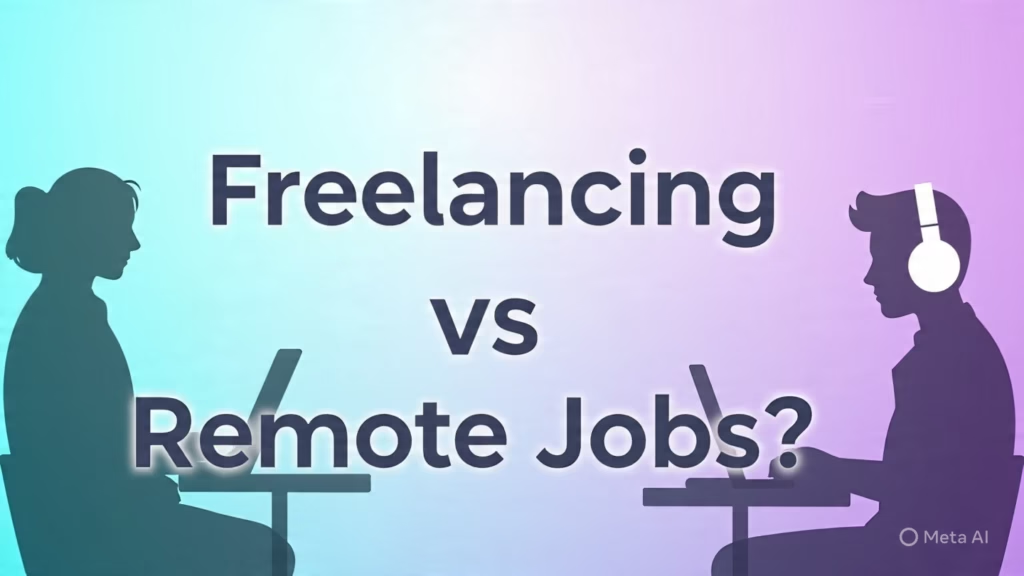
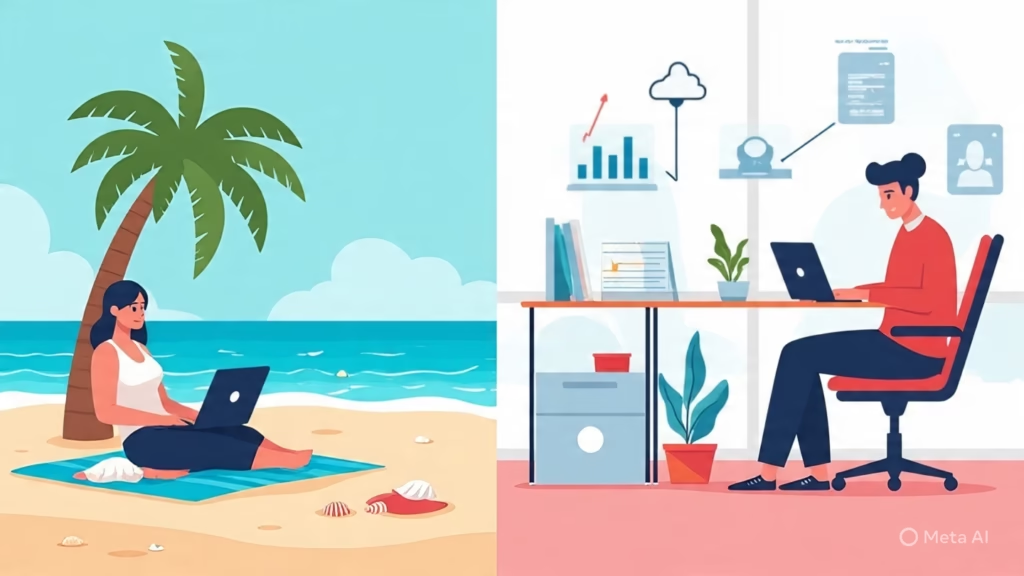
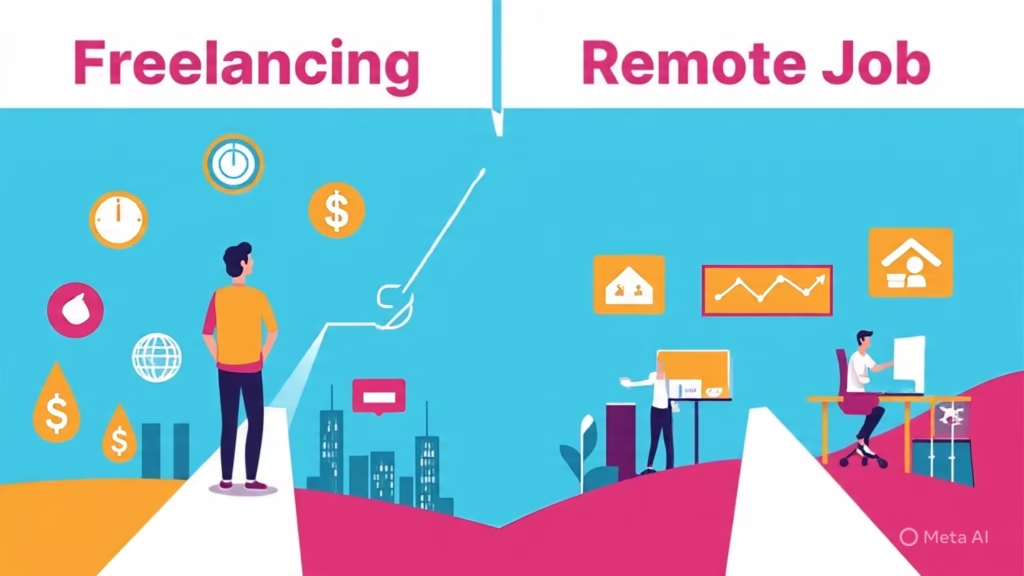

Ready to Choose Your Path?
Freelancing vs Remote Jobs ,
Comment below:
Are you leaning toward freelancing or remote jobs in 2025 — and why?
FAQS: Freelancing vs Remote Jobs
1. What is a better remote job or freelancing as a part-time?
If you want consistent income, part-time remote jobs are better. But if you prefer flexibility and extra earnings, freelancing is ideal. Freelancing allows you to choose projects and rates, but income may vary. Remote jobs usually offer stability with fixed hours.
2. Remote Work & Freelancing?
Remote work means working for a company from home, while freelancing means working independently for clients. Both can be done online, but freelancers are self-employed, and remote workers are employees. Freelancing offers more freedom; remote jobs offer security.
3. If you work remotely, what kind of work do you do?
Remote workers often work in tech, customer support, marketing, content writing, or admin roles. Common positions include virtual assistant, software developer, digital marketer, and data entry specialist. Remote work depends on your skills and the company’s needs.
4. Is remote work and online work the same?
Not exactly. All remote work is online, but not all online work is remote employment. Remote work is structured employment with companies. Online work includes freelancing, microtasks, surveys, etc. The key difference is structure and job type.
5. Which is better: freelancer or work with a company?
Freelancing vs Remote Jobs,
Freelancing offers freedom, higher earning potential, and creative control. Company jobs offer stability, benefits, and predictable income. If you want independence, go freelance. If you want security, choose a company role. Many combine both in 2025.
6. What are the best remote jobs for beginners in 2025?
- Virtual assistant
- Data entry
- Social media manager
- Customer support rep
- Content writer
These roles require basic skills, minimal experience, and offer remote flexibility.
7. Is a remote job better than a 9-to-5 job?
Yes, if you value flexibility, no commuting, and work-life balance. Remote jobs allow more control over your environment. However, traditional 9-to-5 jobs may offer better structure and social interaction. Depends on your lifestyle preference.
8. How to find remote jobs in 2025?
Freelancing vs Remote Jobs,
- Use sites like FlexJobs, Remote.co, WeWorkRemotely
- Filter “Remote” on LinkedIn and Indeed
- Set Google Job Alerts
- Network on Twitter, Reddit, and Discord job boards
- Join remote job newsletters
9. Is remote work here to stay, or will it fade post-2024?
Remote work is here to stay. Many companies have shifted to hybrid or fully remote models. Tech advances and employee preferences ensure it continues, especially in creative and IT sectors. Post-COVID, remote is the norm, not a trend.
10. Are freelance/remote jobs hard to find?
Freelancing vs Remote Jobs,
They require effort to find initially, but they’re not rare. Freelancers need to build profiles and pitch well. Remote jobs need targeted applications. With the right platforms and persistence, both are accessible in 2025.
11. Does Remote.co give remote jobs to freelancers?
Remote.co lists remote jobs, not freelance gigs. It’s best for those seeking long-term or part-time remote employment. For freelancing, use platforms like Fiverr, Upwork, or Toptal instead.
12. How is remote work likely to evolve in the next decade?
Expect more global hiring, AI-assisted workflows, and hybrid models. Companies will prioritize results over hours. Digital nomad culture will rise. Tools like virtual offices, VR meetings, and automation will define remote work in the 2030s.
13. What are experts saying about the future of remote work?
Experts predict remote work will keep growing in IT, education, media, and health. AI and automation will make remote collaboration easier. Companies are redesigning policies for remote-first cultures. It’s not a phase—it’s the future.
14. I need a remote job as soon as possible. What should I do?
- Create a strong LinkedIn and resume
- Apply daily on Remote job boards
- Join job Discord servers & Slack channels
- Offer your skills on freelance platforms
- Focus on quick-entry roles (VA, content writing, support)
15. How to start working online and transition to a remote career?
- Identify your skills
- Learn remote tools (Zoom, Slack, Notion)
- Apply to freelance or remote roles
- Build a small portfolio
- Join remote-friendly communities
- Start part-time and scale
16. Are remote jobs better than regular jobs?
For many, yes. Remote jobs save time, reduce stress, and offer better work-life balance. Regular jobs provide structure and clearer boundaries. It depends on your personality, discipline, and lifestyle needs.
17. What is the future of remote work in the IT industry?
IT will remain remote-first. Developers, DevOps, QA, and even AI engineers will continue working remotely. Companies are hiring globally to reduce costs and access diverse talent. Cloud-based systems make this shift seamless.
18. Is freelancing better than a regular job?
Freelancing vs Remote Jobs,
Freelancing gives you more freedom and earning control, but it lacks benefits like insurance and paid leave. A regular job provides security. Best option? Start freelancing part-time and switch when stable.
19. Do people earn a full-time living doing remote jobs?
Yes, thousands do. Many remote employees earn $3K–$10K/month depending on role and company. Remote roles now span junior to senior levels with full-time salaries and benefits.
20. Are remote jobs genuine? How does it work?
Yes, if found through verified platforms (e.g., LinkedIn, Remote.co). You apply online, complete virtual interviews, and work from home using company tools. Avoid jobs that ask for upfront payment or poor grammar.
21. Do you have skills for a Remote job?
You need communication, discipline, time management, and job-specific skills (e.g., writing, coding, support). Learn tools like Zoom, Trello, or Google Workspace. If you can work independently, you’re ready.
22. Muhammad Hamza Jabbar?
Please clarify the question — is this a person you’re referring to for remote work help or a specific expert? I’ll guide better with context.
23. Who’s hiring remotely that pay $25 an hour or more?
- GitLab
- Toptal
- Automattic
- Zapier
- Hotjar
Check their careers pages and apply via AngelList or Remote OK.
24. What do you think the future of remote work is?
It’s the default work model for digital industries. Offices will downsize, hybrid roles will increase, and AI will enhance remote productivity. Expect global teams, less commuting, and more location freedom.
25. What are the top 10 freelancing sites or remote work sites?
- Upwork
- Fiverr
- Toptal
- Freelancer.com
- PeoplePerHour
- FlexJobs
- Remote.co
- We Work Remotely
- AngelList Talent
- Indeed (Remote filter)
26. What are the pros and cons of being a freelancer?
✅ Pros: Flexibility, control, higher rates, creative freedom
❌ Cons: No job security, inconsistent income, self-managed taxes, client hunting
27. How can I be hired for a serious remote job?
- Build a niche-focused resume
- Apply on serious platforms (FlexJobs, We Work Remotely)
- Ace remote interviews
- Prove your communication & project handling skills
- Customize each application
28. How does a remote job work?
Freelancing vs Remote Jobs,
You’re hired by a company to work from home. You use digital tools to communicate, attend meetings, and deliver tasks. Payments, benefits, and responsibilities are same as in-office — just remote.
29. Work From Home Earn Money Online? – WifiMoney’s Space?
This likely refers to content creators teaching income methods online. You can earn via freelancing, affiliate marketing, content creation, or microtask platforms. Verify sources before spending money on courses.
30. Are companies going to stick with remote work?
Yes. Many companies have seen increased productivity and cost savings. Tech firms, agencies, and even finance companies are going remote-first or hybrid. It’s now a hiring advantage.
31. Why do people choose freelancing over full-time jobs?
- Control over time and income
- Ability to work from anywhere
- Escape from office politics
- Passion projects and freedom of choice
- More income potential with fewer constraints
32. Is remote working here to stay for most professionals?
Absolutely. Especially in tech, content, marketing, design, and education. The flexibility and scalability remote work offers make it a permanent fixture for many professionals in 2025.
33. Does ‘remote’ mean that the job can be done from anywhere?
Usually yes, but sometimes it’s location-restricted (e.g., U.S. only). Always check job details. Fully remote = anywhere; Hybrid = some office days; Remote-first = preference for remote work.
34. What are the pros and cons of remote work for employers?
✅ Pros: Lower overhead costs, larger talent pool, happier employees
❌ Cons: Communication challenges, time zone issues, risk of disengagement
35. Which is better, a freelance or a full-time salary-based job?
Depends on your goals. Freelancing = flexibility, control, hustle. Full-time job = stability, benefits, structure. Many in 2025 start with a full-time job and freelance on the side.
36. What are some online jobs? I really badly need a job now.
- Data entry
- Customer support
- Chat moderation
- Virtual assistant
- Social media management
- Online tutoring
Freelancing vs Remote Jobs Start with Upwork, Fiverr, or apply on LinkedIn and FlexJobs.
37. What are the effective ways to work remotely?
- Set a fixed work schedule
- Use productivity tools (Notion, Trello, Clockify)
- Maintain communication with your team
- Create a distraction-free workspace
- Take regular breaks for mental clarity
